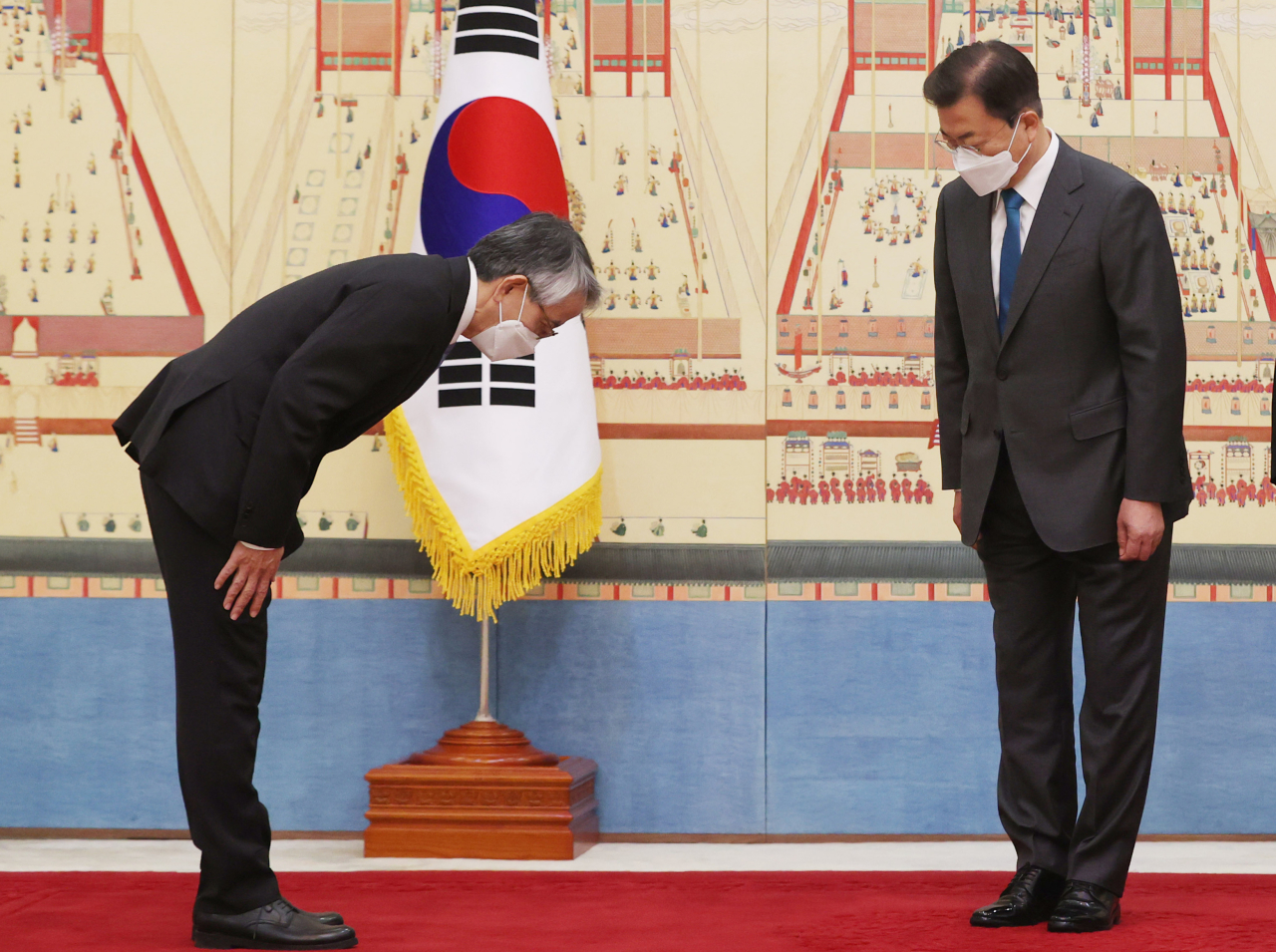Moon hints at legal fight against Fukushima wastewater disposal
By Lee Ji-yoonPublished : April 14, 2021 - 18:02

President Moon Jae-in on Wednesday ordered his aides to review possible legal actions that can be taken against Japan’s decision to release wastewater from its Fukushima nuclear power plant into the ocean, including bringing the issue to an international court.
“The president ordered to proactively consider taking the issue to the International Tribunal for the Law of the Sea, including provisional measures,” presidential spokesperson Kang Min-seok told a press briefing.
The “provisional measures” refer to an interim injunction to stop Japan’s planned wastewater disposal. The injunction can be granted if the issue is considered a violation of international laws or harmful to the maritime environment before a final court ruling is made.
On Tuesday, Japan announced it had decided to release tons of radioactive wastewater from the wrecked Fukushima Dai-ichi nuclear power plant into the Pacific Ocean amid fierce resistance from fisheries at home and neighboring countries.
Since the 2011 meltdown triggered by a massive earthquake and tsunami, there are now about 1.25 million metric tons of wastewater stored in more than 1,000 tanks at the plant site. The storage capacity is expected to run out next year as the water continues to accumulate at a rate of about 170 tons a day.
Japan claimed that the water will be repurified and diluted to meet the regulatory limits for radioactivity level. But even a powerful filtering system cannot remove tritium, the least radioactive of all radioactive elements, raising safety concerns among environmental activists and neighboring countries.
Earlier in the day, Moon also expressed his deep concerns over the issue during a conversation with Japan’s new ambassador here, Koichi Aiboshi, following a ceremony to receive his credentials at Cheong Wa Dae.
“South Korea, as the closest country that shares the sea with Japan, has great concerns over Japan’s decision,” Moon was quoted as saying by his spokesperson, asking the top envoy to convey the message to the Tokyo government.
It is rare for the president to mention such a thorny diplomatic issue during a courtesy call.
According to a senior Cheong Wa Dae official, the presidential office’s legal team has already started the review process to explore taking it to the international court to stop the disposal.
Both South Korea and Japan are members of the International Tribunal for the Law of the Sea, an intergovernmental organization created by the mandate of the Third United Nations Conference on the Law of the Sea.
Experts have said launching the legal challenge could be one of the possible countermeasures, considering it would be more difficult to stop the discharge once it starts from 2023 as planned.
South Korea’s arguments will likely take aim at Tokyo’s insufficient feasibility study on the environmental impact and its passive attitude in sharing related information, including detailed action plans for the release.
The government also plans to seek to join an international inspection team that is planned to be set up by the International Atomic Energy Agency for a thorough review of Japan’s disposal plan.
The latest dispute comes at a time when Seoul-Tokyo relations, long strained over wartime history and trade, have plummeted to one of the lowest ebbs.
Despite a flurry of reconciliatory overtures from South Korea to mend ties over the past months, there has been no official response from Japan, with Seoul’s top envoys facing almost open hostility from local authorities.
Korea’s top envoy to Japan, Kang Chang-il, who took office in February, has not yet met with Japanese Prime Minister Yoshihide Suga or Foreign Minister Toshimitsu Motegi. His predecessor Nam Gwan-pyo met with then Foreign Minister Taro Kono just four days after his arrival.
The cold reception is widely seen as an act of retaliation after a series of court rulings were made here in favor of Korean victims of Japanese atrocities during its 1910-1945 colonial rule.
By Lee Ji-yoon (jylee@heraldcorp.com)








![[KH Explains] Hyundai's full hybrid edge to pay off amid slow transition to pure EVs](http://res.heraldm.com/phpwas/restmb_idxmake.php?idx=644&simg=/content/image/2024/04/18/20240418050645_0.jpg&u=20240419100350)







![[From the Scene] Monks, Buddhists hail return of remains of Buddhas](http://res.heraldm.com/phpwas/restmb_idxmake.php?idx=652&simg=/content/image/2024/04/19/20240419050617_0.jpg&u=20240419175937)

![[KH Explains] Hyundai's full hybrid edge to pay off amid slow transition to pure EVs](http://res.heraldm.com/phpwas/restmb_idxmake.php?idx=652&simg=/content/image/2024/04/18/20240418050645_0.jpg&u=20240419100350)

![[Today’s K-pop] Illit drops debut single remix](http://res.heraldm.com/phpwas/restmb_idxmake.php?idx=642&simg=/content/image/2024/04/19/20240419050612_0.jpg&u=)